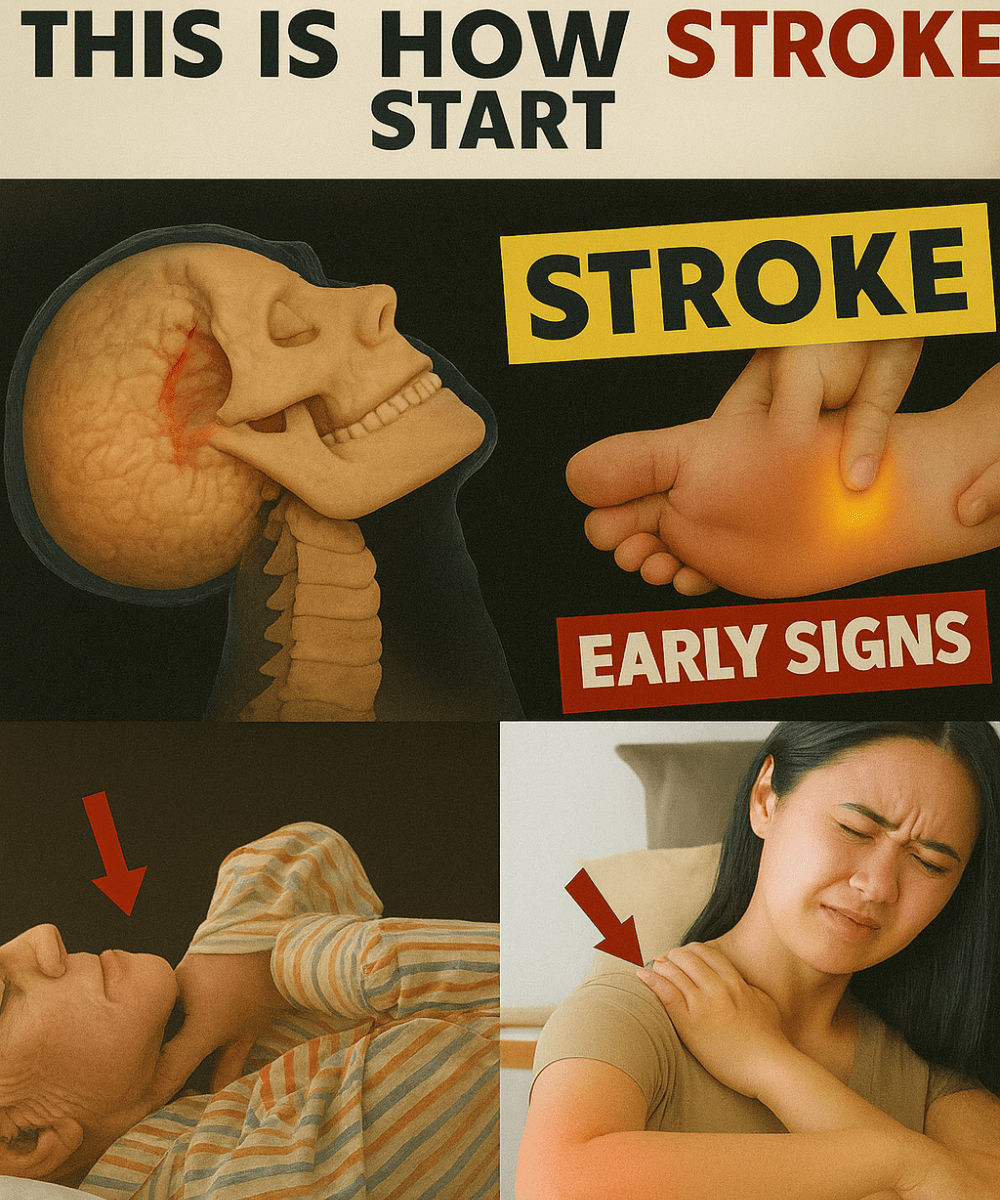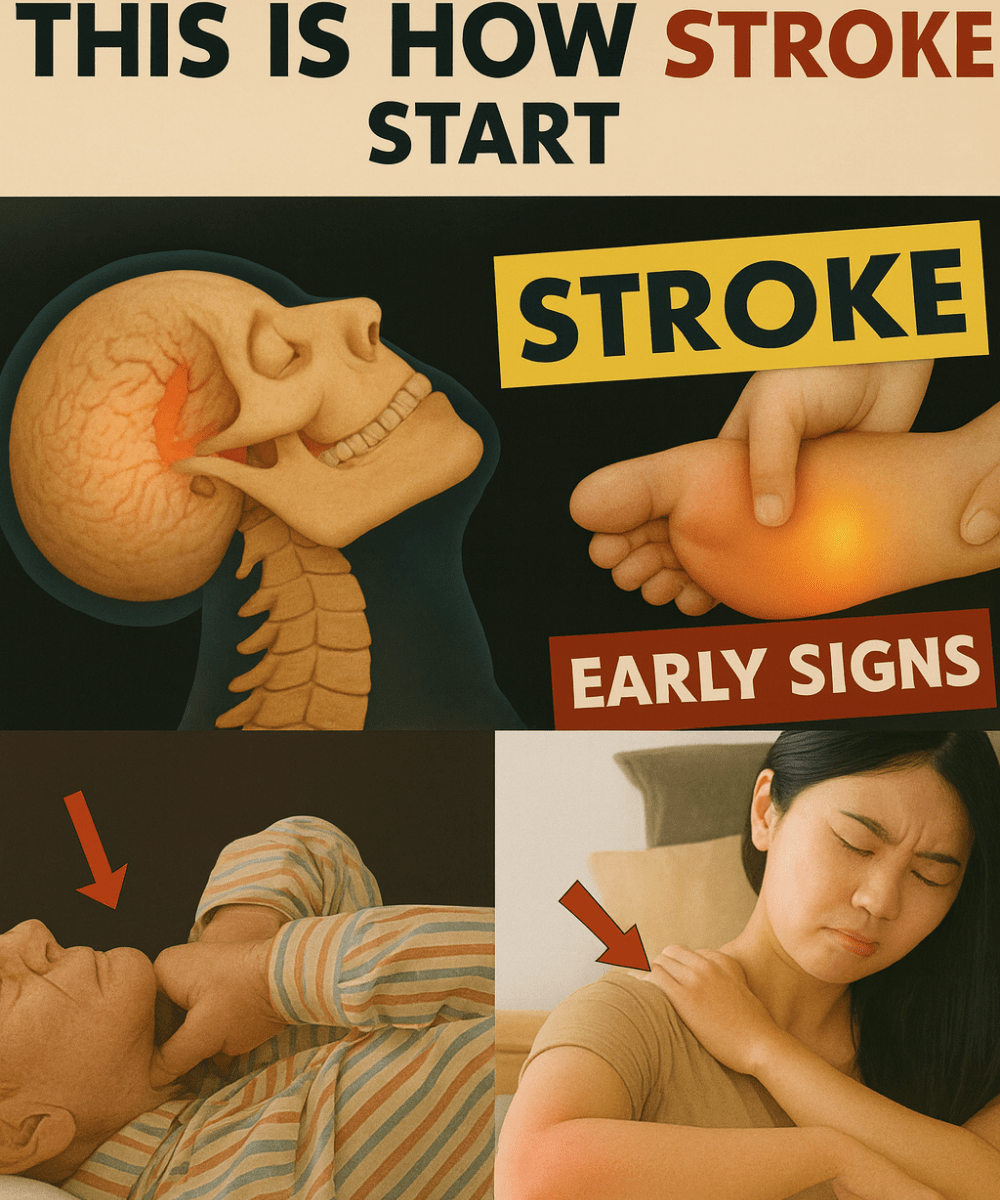Imagine this: you’re going about your day, feeling just a little off, but brushing it aside as stress or fatigue. What if those subtle signals were your body’s way of sounding an alarm—one you can’t afford to ignore? A stroke can strike without warning, but your body often sends clues up to a month in advance. Knowing these signs could save your life or someone you love. Even better, there are powerful, actionable steps you can take today to slam the brakes on this silent threat.

This isn’t just another health article—it’s your roadmap to spotting danger early and taking control of your health with confidence. Let’s dive into the 8 warning signs that could appear a month before a stroke and the 9 powerful prevention tips that can transform your life. Stick with us, because every second you spend reading this could be a step toward a healthier, stroke-free future.
🛑 What Is a Stroke and Why Should You Care?
A stroke happens when blood flow to your brain is interrupted, either by a clot (ischemic stroke) or a burst blood vessel (hemorrhagic stroke). Without oxygen, brain cells start dying within minutes, potentially causing permanent damage or even death. Strokes are a leading cause of disability and death worldwide, but here’s the good news: up to 80% of strokes are preventable. Recognizing early warning signs and making smart lifestyle choices can dramatically lower your risk. Ready to learn how? Let’s start with the signs your body might be waving like red flags.
🚩 8 Warning Signs of a Stroke You Might Notice a Month Before
Your body is always talking to you—sometimes in whispers, sometimes in shouts. These subtle symptoms could be early warnings of a stroke brewing. Pay attention, because catching them early could be a game-changer.
1. 🥴 Sudden Dizziness or Loss of Balance
Feeling like the room is spinning or struggling to stay steady on your feet? Occasional dizziness might seem harmless, but if it comes on suddenly or happens repeatedly, it could signal reduced blood flow to your brain. Don’t dismiss it as just being tired—take note, especially if it’s paired with other symptoms.
2. 😵 Unexplained Fatigue That Won’t Quit
We all get tired, but persistent, overwhelming fatigue that lingers for days or weeks isn’t normal. It could mean your brain isn’t getting enough oxygen due to poor circulation, a potential precursor to a stroke. If you’re sleeping enough but still feel drained, your body might be trying to tell you something.
3. 🤕 Severe Headaches Out of Nowhere
A sudden, intense headache that feels different from your usual tension or migraine pain could be a warning sign. Known as a “sentinel headache,” this could indicate a small bleed in the brain or weakened blood vessels—both red flags for a potential stroke.

4. 😣 Vision Problems That Come and Go
Blurry vision, double vision, or sudden trouble seeing in one or both eyes can point to issues with blood flow to the brain. These episodes might be brief, but they’re not something to ignore. If your vision feels off, even temporarily, it’s time to pay attention.
5. 🖐️ Numbness or Weakness in One Side
Feeling numbness, tingling, or weakness in your face, arm, or leg—especially on one side of your body—is a classic stroke warning sign. These symptoms might come and go, mimicking a “mini-stroke” (transient ischemic attack, or TIA), which is a temporary blockage that often precedes a full-blown stroke.
6. 🗣️ Trouble Speaking or Understanding
Struggling to find the right words, slurring your speech, or having difficulty understanding others could indicate a problem in the brain’s language centers. If conversations suddenly feel confusing or your speech feels off, don’t brush it aside.
7. 😓 Memory Lapses or Confusion
Forgetting small details is one thing, but sudden memory lapses, difficulty focusing, or feeling mentally foggy could signal reduced blood flow to the brain. If these episodes are frequent or intense, they could be early clues of stroke risk.
8. 😖 Chest Pain or Irregular Heartbeat
Your heart and brain are closely connected. An irregular heartbeat (atrial fibrillation) or unexplained chest pain could increase your risk of blood clots, which can travel to the brain and cause a stroke. If your heart feels “off,” it’s a sign to take seriously.
These signs don’t always mean a stroke is coming, but they’re your body’s way of saying, “Check in with me.” If you notice one or more of these symptoms, especially if they’re sudden or persistent, consult a healthcare professional immediately. Now, let’s shift gears to something even more empowering: how to prevent a stroke before it even gets close.
💪 9 Powerful Tips to Prevent a Stroke and Take Control of Your Health
Prevention is your best weapon against a stroke. These nine strategies aren’t just tips—they’re lifestyle shifts that can protect your brain, heart, and overall well-being. Start today, and you’ll be building a stronger, healthier future.
1. 🥗 Eat a Brain-Healthy Diet
Fuel your body with foods that fight stroke risk. Load up on fruits, vegetables, whole grains, lean proteins, and healthy fats like those found in nuts, avocados, and olive oil. Cut back on processed foods, excess salt, and trans fats, which can clog arteries and raise blood pressure. Think Mediterranean diet: colorful, fresh, and delicious.
2. 🏃♂️ Move Your Body Every Day
Exercise is a stroke-prevention powerhouse. Aim for at least 150 minutes of moderate activity (like brisk walking) or 75 minutes of vigorous activity (like running) each week. Physical activity lowers blood pressure, improves circulation, and keeps your heart strong. Even a daily 20-minute walk can make a difference.
3. 🩺 Monitor Your Blood Pressure
High blood pressure is the leading cause of stroke. Check your blood pressure regularly, and if it’s consistently above 120/80 mmHg, work with your doctor to bring it down. Simple changes like reducing salt, managing stress, and staying active can help keep your numbers in check.
4. 🚭 Quit Smoking for Good
Smoking damages blood vessels, raises blood pressure, and increases clot risk—basically, it’s a stroke’s best friend. Quitting isn’t easy, but it’s one of the most powerful things you can do for your health. Seek support from apps, counseling, or nicotine replacement therapies to kick the habit.
5. 🍷 Limit Alcohol to Protect Your Brain
Heavy drinking can spike blood pressure and increase stroke risk. Stick to moderate drinking—no more than one drink per day for women and two for men. Better yet, swap that extra glass of wine for a refreshing herbal tea or sparkling water.
6. 🥰 Manage Stress Like a Pro
Chronic stress can raise your blood pressure and trigger unhealthy habits like overeating or smoking. Find stress-busters that work for you: meditation, yoga, deep breathing, or even a hobby you love. A calm mind is a stroke-resistant mind.
7. 🩺 Control Chronic Conditions
Diabetes, high cholesterol, and heart disease are major stroke risk factors. Work closely with your doctor to manage these conditions through medication, diet, and lifestyle changes. Keeping them under control is like putting a shield around your brain.
8. 💤 Prioritize Quality Sleep
Poor sleep can raise your blood pressure and stress levels, both of which increase stroke risk. Aim for 7-9 hours of quality sleep per night. Create a relaxing bedtime routine, limit screen time, and keep your bedroom cool and dark for optimal rest.
9. 🩺 Get Regular Check-Ups
Routine health screenings can catch issues like high blood pressure, cholesterol, or irregular heart rhythms before they become serious. Schedule annual check-ups, and don’t skip them—even if you feel fine. Prevention is all about staying one step ahead.
🌟 Your Next Steps: Act Now to Protect Your Future
Knowledge is power, but action is everything. Now that you know the warning signs of a stroke and the steps to prevent it, you’re armed with the tools to take charge of your health. Start small: check your blood pressure, take a walk, or swap out one processed snack for a piece of fruit. Every choice you make today builds a stronger, healthier tomorrow.
If you or someone you know is experiencing any of the warning signs mentioned, don’t wait—contact a healthcare provider immediately. Strokes are serious, but they’re also preventable. You have the power to change your story. Which tip will you start with today? Your brain will thank you.






